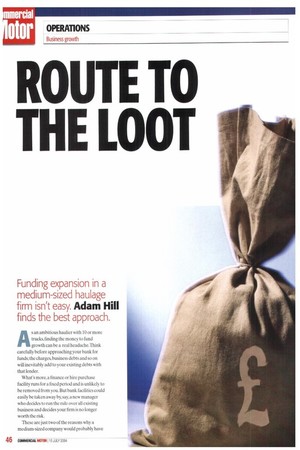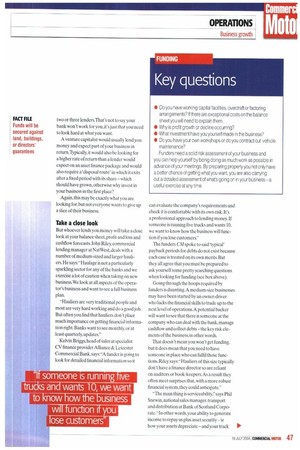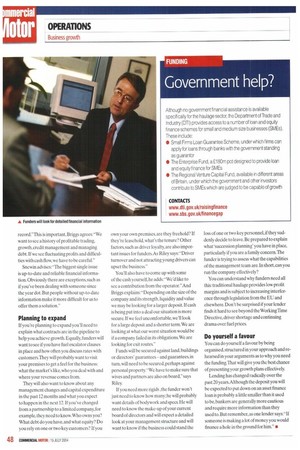ROUTE TO THE LOOT
Page 46

Page 47

Page 48

If you've noticed an error in this article please click here to report it so we can fix it.
Funding expansion in a medium-sized haulage firm isn't easy. Adam Hill finds the best approach.
As an ambitious haulier with 10 or more trucks. finding the money to fund growth can be a real headache.Think carefully before approaching your bank for funds: the charges, business debts and so on will inevitably add to your existing debts with that lender.
What's more, a finance or hire purchase facility runs for a fixed period and is unlikely to be removed from you But bank facilities could easily be taken away by, say, a new manager who decides to run the rule over all existing business and decides your firm is no longer worth the risk.
These are just two of the reasons why a medium-sized company would probably have two or three lenders,That's not to say your bank won't work for you, it's just that you need to look hard at what you want.
A venture capitalist would usually lend you money and expect part of your business in return.Typically, it would also be looking for a higher rate of return than a lender would expect on an asset finance package and would also require a 'disposal route' in which it exits after a fixed period with its share which should have grown, otherwise why invest in your business in the first place?
Again, this may be exactly what you are looking for, but not everyone wants to give up a slice of their business.
Take a close look
But whoever lends you money will take a close look at your balance sheet, profit and loss and cashflow forecasts. John Riley, commercial lending manager at NatWest, deals with a number of medium-sized and larger hauliers. He says: "Haulage is not a particularly sparkling sector for any of the banks and we exercise a lot of caution when taking on new business.We look at all aspects of the operator's business and want to see a full business plan.
"Hauliers are very traditional people and most are very hard working and do a good job. But often you find that hauliers don't place much importance on getting financial information right. Banks want to see monthly. or at least quarterly,updates."
Kelvin Briggs, head of sales at specialist CV finance provider Alliance & Leicester Commercial Bank, says: "A fonder is going to look for detailed financial information so it can evaluate the company's requirements and check it is comfortable with its own risk. It's a professional approach to lending money. If someone is running five trucks and wants 10, we want to know how the business will function if you lose customers.
The funders CM spoke to said 'typical' payback periods for debts do not exist because each case is treated on its own merits. But they all agree that you must be prepared to ask yourself some pretty searching questions when looking for funding (see box above).
Going through the hoops required by funders is daunting.A medium-size businesses may have been started by an owner-driver who lacks the financial skills to trade up to the next level of operations.A potential backer will want to see that there is someone at the company who can deal with the bank,manage cashfiow and collect debts the key risk elements of the business, in other words.
That doesn't mean you won't get funding, but it does mean that you need to have someone in place who can fulfil those functions. Riley says:"Hauliers of this size typically don't have a finance director so are reliant on auditors or book-keepers. As a result they often meet surprises that, with a more robust financial system, they could anticipate."
"The main thing is serviceability," says Phil Snewin, national sales manager, transport and distribution at Bank of Scotland Corporate. "In other words. your ability to generate income to repay us plus asset security -ie how your assets depreciate and your track record."Ttlis is important.Briggs agrees:"We want to see a history of profitable trading, growth, credit management and managing debt. If we see fluctuating profits and difficulties with cash flow, we have to be careful."
Snewin advises: "The biggest single issue is up-to-date and reliable financial information. Obviously there are exceptions, such as if you've been dealing with someone since the year dot. But people without up-to-date information make it more difficult for us to offer them a solution."
Planning to expand
If you're planning to expand you'll need to explain what contracts are in the pipeline to help you achieve growth. Equally, funders will want to see if you have fuel escalator clauses in place and how often you discuss rates with customers.They will probably want to visit your premises to get a feel for the business: what the market's like, who you deal with and where your revenue comes from.
They will also want to know about any management changes and capital expenditure in the past 12 months and what you expect to happen in the next 12. If you've changed from a partnership to a limited company, for example, they need to know. Who owns you? What debt do you have, and what equity? Do you rely on one or two key customers? If you own your own premises. are they freehold? If they're leasehold, what's the tenure? Other factors, such as driver loyalty, are also important issues for funders.As Riley says: "Driver turnover and not attracting young drivers can upset the business."
You'll also have to come up with some of the cash yourself, he adds:"We'd like to see a contribution from the operator."And Briggs explains:"Depending on the size of the company and its strength, liquidity and value we may be looking for a larger deposit. If cash is being put into a deal our situation is more secure. If we feel uncomfortable, we'll look for a large deposit and a shorter term.We are looking at what our worst situation would be if a company failed in its obligations. We are looking for exit routes."
Funds will be secured against land, buildings or directors' guarantees — and guarantees, in tum, will need to be secured, perhaps against personal property. "We have to make sure that wives and partners are also on board," says Riley.
If you need more rigids .the [under won't just need to know how many:he will probably want details of bodywork and specs. He will need to know the make-up of your current board of directors and will expect a detailed look at your management structure and will want to know if the business could stand the loss of one or two key personnel, if they suddenly decide to leave. Be prepared to explain what 'succession planning' you have in place, particularly if you are a family concern.The [under is trying to assess what the capabilities of the management team are. In short, can you run the company effectively?
You can understand why funders need all this: traditional haulage provides low profit margins and is subject to increasing interference through legislation from the EU and elsewhere. Don't be surprised if your lender finds it hard to see beyond the Working Time Directive, driver shortage and continuing drama over fuel prices.
Do yourself a favour
You can do yourself a favour by being organised, structured in your approach and rehearsed in your arguments as to why you need the funding.That will give you the best chance of presenting your growth plans effectively.
Lending has changed radically over the past 20 years. Although the deposit you will be expected to put down on an asset finance loan is probably a little smaller than it used to be, bankers are generally more cautious and require more information than they used to. But remember, as one lender says: "if someone is making a lot of money you would finance a hole in the ground for him." •






































































































































































































